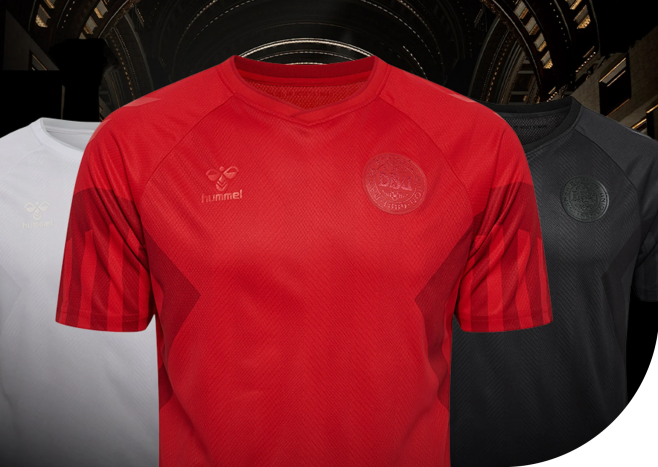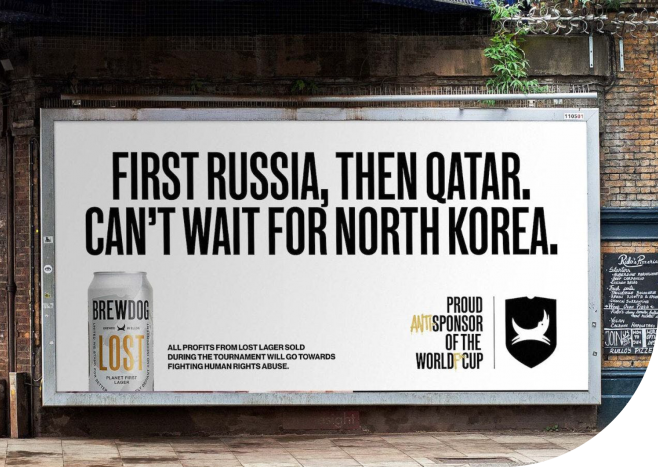The Qatar World Cup Dilemma for Brands
Normally World Cups are a carefree bonanza for brands.
A festival of football in places like Germany and Brazil or legacy-delivering competitions in South Africa and the USA, with a month’s worth of matches for an eager global audience.
Normally World Cups are a carefree bonanza for brands.
A festival of football in places like Germany and Brazil or legacy-delivering competitions in South Africa and the USA, with a month’s worth of matches for an eager global audience.
And from kick off in game one to the lifting of that famous golden trophy, all those corporate partners, sponsors and sportswear companies with kit, boots and balls on show just sit back, relax and watch arguably “The Greatest Show on Earth”.
Controversy is normally limited to refereeing decisions or bad behaviour of fans.
But not so Qatar.
Recently, Hummel, which makes the Danish football kit, announced their strip for the Qatar World Cup would be plain – no obvious badges or logos.

In any other circumstances, branding and marketing suicide.
The national team badge, Hummel logo and decorative white chevrons – a famous feature of the Denmark shirt since the 1980s – are faded into the same single colour as the shirt. Visible, but only just.
And there is an all-black change strip, to honour the many migrant workers who died working on the huge construction projects to convert a non-footballing nation into a World Cup host.
In an Instagram post, Hummel said, “While we support the Danish national team all the way, this shouldn’t be confused with support for a tournament that has cost thousands of people their lives.”
Qatar’s World Cup organisers, the Supreme Committee for Delivery and Legacy, disputed Hummel’s claim and said it had “engaged in robust and transparent dialogue” with the Danish football federation.
FIFA has rules to prohibit political statements on team strips, but the three Danish shirts, in all-red, all-white and all-black, comply as they display no words or symbols.
So, is this a masterstroke of reading the room on a global scale or a simple opportunity to boost profits?
This unique kit is available to buy and will be seen as something of a collectors’ item.
Addressing accusations of profits being behind the re-design, Hummel owner Christian Stadil told The Athletic: “It’s difficult to navigate through this world when you want to make a difference, but you’re also a commercial company.
“For context, we’ve got into quite an extensive collaboration with Amnesty International, for at least two years. They’re going to help us become a company who can better navigate where to manufacture our clothes, where to produce, where to avoid.
“We also have an agreement that we’ll give one per cent of our revenue from all online sales to Amnesty, which included the Denmark kit, and that will hopefully add up to a lot of money.”
Other brands involved in the Qatar World Cup have so far stayed silent – the dilemma a fine balance between taking a stance that looks genuine, so not copycat or knee-jerk, or deciding to do nothing, however unpalatable that may seem.
No such dilemma for those without a stake in the event.
Brewdog recently announced themselves as the “Proud Anti-Sponsor of the World F*Cup” with the slogan, “First Russia, then Qatar, we can’t wait for North Korea.”

The company has promised all profits from sales of its Lost lager during the tournament will go towards fighting human rights abuse.
A noble cause, but the social media backlash wasn’t long in coming as the company had previously been accused by former employees of creating a “culture of fear” in the workplace.
And it was pointed out that Brewdog pubs would still be showing World Cup matches – a stance seemingly not really aligned with its ad campaign.
Although the brewery said this would increase sales of Lost, and so up the charitable contributions, it would also, inevitably, drive sales of other beers without any shared profit promise.
Ultimately, consumers aren’t interested in ad campaigns and rhetoric, but what companies are actually doing.
Hummel can point to a partnership with Amnesty to give their eye-catching Qatar protest authenticity. A key element others lack.
World Cups, unlike Olympic Games, are not normally targets for protests or boycotts.
But this World Cup is different, mired in controversy and allegations of corruption from the moment FIFA President Sepp Blatter announced Qatar as a host back in 2010, a decision he has recently said was a “mistake”.
“Expect Amazing” was the slogan which carried Qatar’s campaign to victory 12 years ago.
Germany’s tournament slogan in 2006 was “a time to make friends”.
Living up to either motto is going to be difficult for the Gulf state to achieve.


